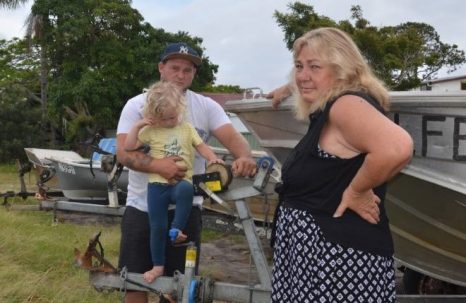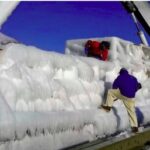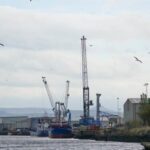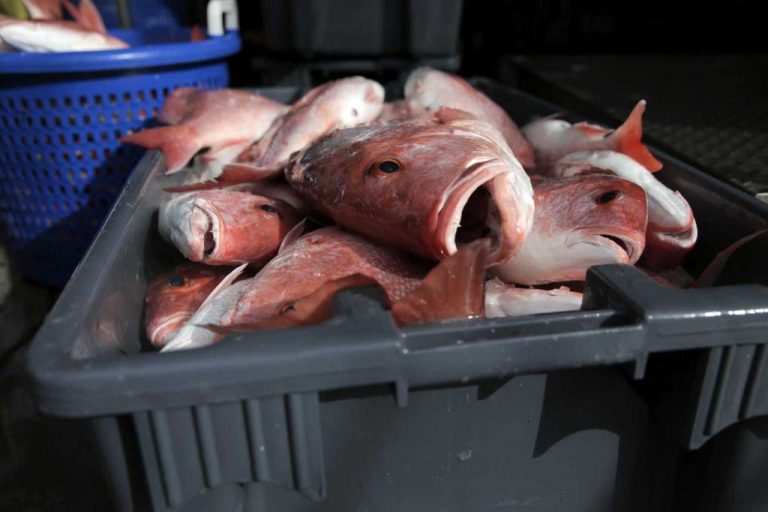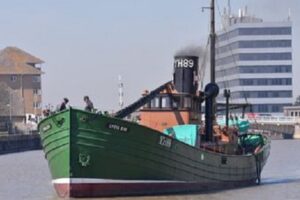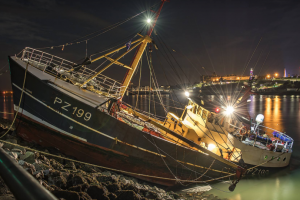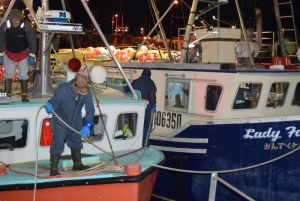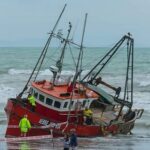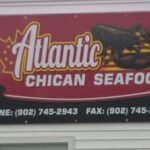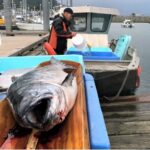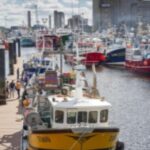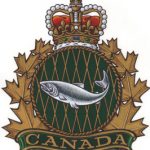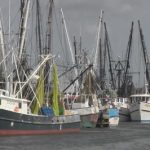Monthly Archives: March 2017
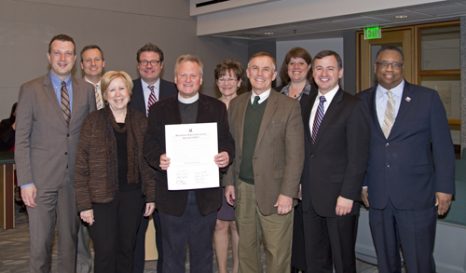
“Blessing of the Fleet” – County Council joins in wishing “safe fishing” to crews preparing to head to Alaska
Washington is known for having some of the best seafood in the world, much brought to our shores from crews preparing to go to Alaska for the summer fishing season. The Metropolitan King County Council today recognized those brave men and women who will spend their summer in the North Pacific by recognizing the “Blessing of the Fleet” which will occur this weekend, the start of the halibut fishing season. “Commercial fishing has been a foundation of our economy for over a century. Fishers risk their lives, and their families risk the loss of their loved ones every year. The fishing industry is an integral part of our King County community,” said Councilmember Jeanne Kohl-Welles, the sponsor of the recognition. “We also acknowledge the many years of participation by the Ballard First Lutheran Church in the annual Blessing of the Fleet. We wish the fleet an abundant and abundantly healthy start of the season!” continue reading the story here 21:40
The Pacific Fishery Management Council meeting in Vancouver, Washington. March 7-13, 2017
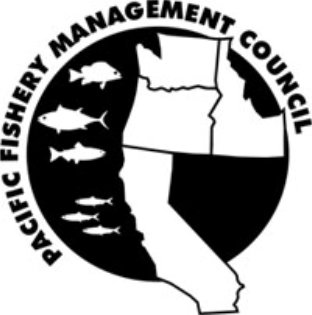 The Pacific Fishery Management Council (Council) and its advisory bodies will meet March 7-13, 2017 in Vancouver, Washington. Advisory bodies will start Tuesday, March 7. The Council session will start on Wednesday, March 8 to address issues related to salmon, groundfish, highly migratory species, ecosystem, Pacific halibut, and habitat matters. For agenda item topics, please see the March 2017 meeting agenda. The March 2017 Council meeting will be live‐streamed. Click http://www.gotomeeting.com/online/webinar/join-webinar Enter the Webinar ID – The March 8-13, 2017 Webinar ID is: 897-986-459 Please enter your email address (required) Click here for details 20:43
The Pacific Fishery Management Council (Council) and its advisory bodies will meet March 7-13, 2017 in Vancouver, Washington. Advisory bodies will start Tuesday, March 7. The Council session will start on Wednesday, March 8 to address issues related to salmon, groundfish, highly migratory species, ecosystem, Pacific halibut, and habitat matters. For agenda item topics, please see the March 2017 meeting agenda. The March 2017 Council meeting will be live‐streamed. Click http://www.gotomeeting.com/online/webinar/join-webinar Enter the Webinar ID – The March 8-13, 2017 Webinar ID is: 897-986-459 Please enter your email address (required) Click here for details 20:43
Christie administration formally asks Department of Commerce to withdraw summer flounder quota
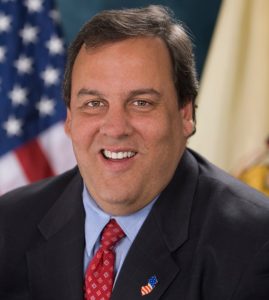 The Gov. Christie administration has filed a formal request with the U.S. Department of Commerce to stop restrictions on recreational summer flounder fishing from going into effect. The department oversees fisheries management under the auspices of the National Oceanic and Atmospheric Administration. The proposed NOAA quota calls for a reduction of summer flounder recreational and commercial limits by 30% in 2017 and 16% in 2018. In a news release, Department of Environmental Protection Commissioner Bob Martin said the limits would have a devastating impact on the state. He added that the rules vary “too widely” yearly, causing uncertainty for fisheries managers and anglers. Also, according to Martin, the state has more than 30 years of fish trawl surveys that indicate a measurable increase in the summer flounder stock offshore. Read the story here 16:06
The Gov. Christie administration has filed a formal request with the U.S. Department of Commerce to stop restrictions on recreational summer flounder fishing from going into effect. The department oversees fisheries management under the auspices of the National Oceanic and Atmospheric Administration. The proposed NOAA quota calls for a reduction of summer flounder recreational and commercial limits by 30% in 2017 and 16% in 2018. In a news release, Department of Environmental Protection Commissioner Bob Martin said the limits would have a devastating impact on the state. He added that the rules vary “too widely” yearly, causing uncertainty for fisheries managers and anglers. Also, according to Martin, the state has more than 30 years of fish trawl surveys that indicate a measurable increase in the summer flounder stock offshore. Read the story here 16:06
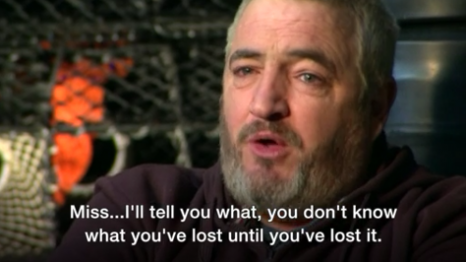
Fishermen warned of the dangers of using drugs while at sea
Fishermen are being warned of the dangers of using drugs while at sea following several deaths linked to the use of amphetamines. In the last two years, 15% of fishing vessel accidents have involved drug abuse. Micky Hill’s son, Mike, was skipper of a scallop dredger when it capsized off Teignmouth, Devon. He died aged 22, along with Shane Hooper, 34 , who was found with amphetamines in his system. Mr Hill says Mike would not have allowed Shane on board if he’d known he’d been using drugs. Watch video here. We have a drug problem, people. One of the articles that continues to get an amazing amount of hits is about Wicked Tuna Fisherman Adam James Moser, age 27, of Portsmouth, N.H. whom passed away September 19, 2015, from an apparent overdose Link to the article 13:20
Crab ban timing aggravates fishermen – “It’s not too late. Give us an emergency opening.”
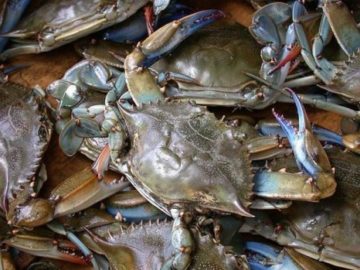 Crab fishermen are expressing frustration over how the state’s 30-day crab season moratorium was set for the weeks leading up to Lent when prices are higher. “Not during Lent, that’s what we’re saying. We don’t need to change the season, we need to change the date,” said Patrick Luke, a crab fisherman and the owner of P&S Seafood & Fuel in Dulac. Luke said crab fisherman wouldn’t be complaining if the closure was in October when prices are traditionally much lower. February is also “a period of time where we are allowed to pick up derelict crab traps. “So now you’re going to open back up this season, March 20, and you’re gonna have record crabs,” Luke said. “Say you had 50,000 pounds on that day. You’re gonna have like 500,000 pounds. The market can’t take it. So then what’s going to happen? The price is gonna drop. Who hurts? The fisherman.” Read the story here 10:58
Crab fishermen are expressing frustration over how the state’s 30-day crab season moratorium was set for the weeks leading up to Lent when prices are higher. “Not during Lent, that’s what we’re saying. We don’t need to change the season, we need to change the date,” said Patrick Luke, a crab fisherman and the owner of P&S Seafood & Fuel in Dulac. Luke said crab fisherman wouldn’t be complaining if the closure was in October when prices are traditionally much lower. February is also “a period of time where we are allowed to pick up derelict crab traps. “So now you’re going to open back up this season, March 20, and you’re gonna have record crabs,” Luke said. “Say you had 50,000 pounds on that day. You’re gonna have like 500,000 pounds. The market can’t take it. So then what’s going to happen? The price is gonna drop. Who hurts? The fisherman.” Read the story here 10:58
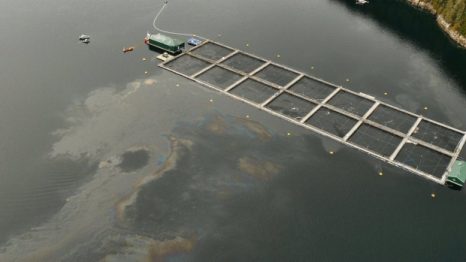
Emergency crews responding to Burdwood Fish Farm diesel spill near northern Vancouver Island
Emergency crews are responding to a diesel spill at a fish farm near the northern tip of Vancouver Island. Early Sunday officials said at least 1,500 litres of diesel overflowed from the Burdwood Fish Farm in Echo Bay, B.C., northeast of Port McNeill. Farm crews reported the smell of diesel to Emergency Management B.C. just before 5 a.m. PT, according to an official report. Fisheries and Oceans Canada (DFO) says the spill was caused by a diesel pump that was left on overnight. Shortly after 2 p.m., Courtney Bransfield, emergency program co-ordinator for the Mount Waddington Regional District, said all the recoverable diesel had been “contained to the farm’s fish pens” and absorbents to soak up the spill were in place. The company that owns the site, Cermaq Canada, issued a statement later on Sunday that the amount of diesel spilled was closer to 600 litres. continue reading the story here 09:41
NOAA Turns a Blind Eye – How manipulation and corruption are making a mockery of federal fisheries management
 This question often comes up in discussions about the federal fisheries management process: Why are people who profit from the harvest and sale of America’s marine resources allowed to sit on management bodies that make regulations governing those resources? It’s a good question. The most contentious issue in the Gulf of Mexico is privatization of the red snapper fishery in which millions of dollars’ worth of a public resource was gifted to select commercial operators to harvest for their own personal profit. Gifted, for free. Yet, someone who owns red snapper shares can sit on the Gulf Council and vote on every aspect of that fishery. And one does. Over the past few years, certain members of the charter/for-hire sector have worked to launch a privatization program in which they, too, could own shares and use red snapper as their own. Yet, on the Gulf Council, people who own charter businesses and stand to directly benefit from the program are never required to recuse themselves from votes on that program. continue reading the article here 08:24
This question often comes up in discussions about the federal fisheries management process: Why are people who profit from the harvest and sale of America’s marine resources allowed to sit on management bodies that make regulations governing those resources? It’s a good question. The most contentious issue in the Gulf of Mexico is privatization of the red snapper fishery in which millions of dollars’ worth of a public resource was gifted to select commercial operators to harvest for their own personal profit. Gifted, for free. Yet, someone who owns red snapper shares can sit on the Gulf Council and vote on every aspect of that fishery. And one does. Over the past few years, certain members of the charter/for-hire sector have worked to launch a privatization program in which they, too, could own shares and use red snapper as their own. Yet, on the Gulf Council, people who own charter businesses and stand to directly benefit from the program are never required to recuse themselves from votes on that program. continue reading the article here 08:24
Fisherman says scene like ‘The Perfect Storm’ before being hoisted to safety
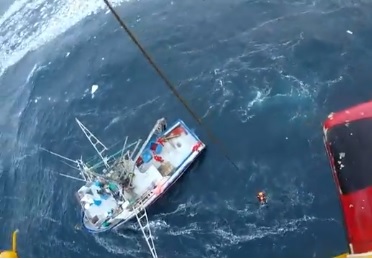 One of five fishermen who were plucked from churning, windswept seas off Newfoundland says they weren’t sure they’d make it as their boat was battered by “a perfect storm.” Frank Brown was with four other crew aboard the Northern Provider when a vicious storm came on quickly Sunday about 150 nautical miles northeast of St. John’s. Brown says the scene was similar to the movie The Perfect Storm, “but with a better ending,” for the crew that had been at sea since Monday in search of seals. He says they ran into trouble coming home Sunday morning when winds suddenly gusting to 60 knots pushed swells up to 10 metres. A coast guard helicopter was dispatched after the crew sent out a distress call, but conditions were so rough they couldn’t be taken off the boat and had to jump in the water before they could be hoisted up to the chopper. The Northern Provider was abandoned in the high seas, and Coast guard vessels have been dispatched to see if it’s still afloat. Link 07:54
One of five fishermen who were plucked from churning, windswept seas off Newfoundland says they weren’t sure they’d make it as their boat was battered by “a perfect storm.” Frank Brown was with four other crew aboard the Northern Provider when a vicious storm came on quickly Sunday about 150 nautical miles northeast of St. John’s. Brown says the scene was similar to the movie The Perfect Storm, “but with a better ending,” for the crew that had been at sea since Monday in search of seals. He says they ran into trouble coming home Sunday morning when winds suddenly gusting to 60 knots pushed swells up to 10 metres. A coast guard helicopter was dispatched after the crew sent out a distress call, but conditions were so rough they couldn’t be taken off the boat and had to jump in the water before they could be hoisted up to the chopper. The Northern Provider was abandoned in the high seas, and Coast guard vessels have been dispatched to see if it’s still afloat. Link 07:54
Search and Rescue,150NM NE St John’s NL,5 Mar 2017
Five fishermen have been rescued from a fishing boat in distress 150 miles northeast of St. John’s today 21:27
Bumper harvest as herring return to Strait of Georgia in great numbers
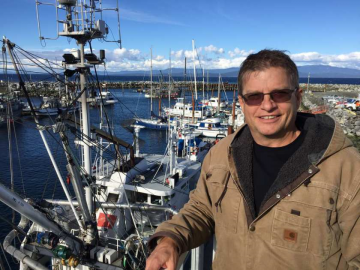 The commercial roe-herring fishery opened with a flourish over the weekend as the gillnet fleet took its share of what the federal government predicts to be “near-historic” returns to the Strait of Georgia. The height of the action took place just north of Parksville, where gillnetters unfurled their nets in choppy seas and high winds along the east coast of Vancouver Island. Curious onlookers lined the shoreline, some with cameras and others with sport-fishing rods. Gulls and sea lions patrolled for their own catch. Milt — the seminal fluid — released by the male herring gave the cobalt ocean waters an exotic milky-turquoise colour. “It’s like a big orgy in a hot tub,” offered Brad McLean, owner of French Creek Seafood, watching from his second-floor office window. “It’s pretty, if you don’t think of what it is.” continue reading the story here 20:18
The commercial roe-herring fishery opened with a flourish over the weekend as the gillnet fleet took its share of what the federal government predicts to be “near-historic” returns to the Strait of Georgia. The height of the action took place just north of Parksville, where gillnetters unfurled their nets in choppy seas and high winds along the east coast of Vancouver Island. Curious onlookers lined the shoreline, some with cameras and others with sport-fishing rods. Gulls and sea lions patrolled for their own catch. Milt — the seminal fluid — released by the male herring gave the cobalt ocean waters an exotic milky-turquoise colour. “It’s like a big orgy in a hot tub,” offered Brad McLean, owner of French Creek Seafood, watching from his second-floor office window. “It’s pretty, if you don’t think of what it is.” continue reading the story here 20:18
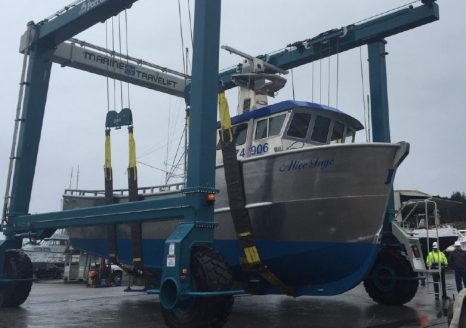
Tarheel Aluminum in Charleston launches first fishing boat since the ’90s
Tarheel Aluminum launched a fishing boat from the Charleston shipyard Friday, the first launch since the 1990s. The 40×15-foot aluminum vessel called the Alice Faye weighed in at 30,000 pounds on the shipyard’s new lift. It’s the first fishing vessel the family-run Tarheel Aluminum has made since the ’90s. Company owner Kyle Cox says their market buyers usually call for barges, so they’re excited to be making fishing vessels again. continue reading the story here with three more photo’s 16:43
South Atlantic Fishery Management Council may hike overall lobster harvest
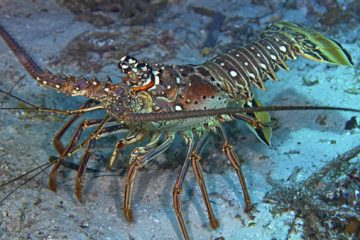 Federal fishery managers meeting this week in Georgia hear proposals to raise the annual limit on spiny lobster harvests, the Florida Keys’ most economically important commercial species. The South Atlantic Fishery Management Council meets from Monday through Friday at the Westin resort in Jekyll Island, Ga. Permit limits in the for-hire (charter) sector in the snapper-grouper fishery also are up for discussion. The council is considering raising the annual catch numbers of spiny lobster because fishers contend that the number were based on yearly averages that include some of the worst lobster seasons on record. Twice in recent years, the harvests have exceeded the current catch limit of 7.3 million pounds. A legal sized spiny lobster weighs about 1 pound. During the bad seasons, “the historic low level of landings that were documented for the species [suggested] biological conditions had changed and that spiny lobster populations were at a new low normal,” says council staff summary. “Since landings have been much higher than anticipated, the review panel… determined that conditions for spiny lobster are likely better than they were during the 10-year period of low landings.” continue reading the story here 14:19
Federal fishery managers meeting this week in Georgia hear proposals to raise the annual limit on spiny lobster harvests, the Florida Keys’ most economically important commercial species. The South Atlantic Fishery Management Council meets from Monday through Friday at the Westin resort in Jekyll Island, Ga. Permit limits in the for-hire (charter) sector in the snapper-grouper fishery also are up for discussion. The council is considering raising the annual catch numbers of spiny lobster because fishers contend that the number were based on yearly averages that include some of the worst lobster seasons on record. Twice in recent years, the harvests have exceeded the current catch limit of 7.3 million pounds. A legal sized spiny lobster weighs about 1 pound. During the bad seasons, “the historic low level of landings that were documented for the species [suggested] biological conditions had changed and that spiny lobster populations were at a new low normal,” says council staff summary. “Since landings have been much higher than anticipated, the review panel… determined that conditions for spiny lobster are likely better than they were during the 10-year period of low landings.” continue reading the story here 14:19
South Atlantic Fishery Management Council meeting in Jekyll Island, GA March 6-10, 2017
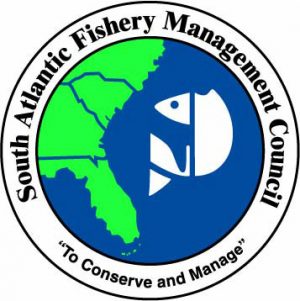 The public is invited to attend the South Atlantic Fishery Management Council to be held at The Westin Jekyll Island, 110 Ocean Way, Jekyll Island, GA 31527, USA. Click here for details Webinar Registration: Listen Live, Click here 14:00
The public is invited to attend the South Atlantic Fishery Management Council to be held at The Westin Jekyll Island, 110 Ocean Way, Jekyll Island, GA 31527, USA. Click here for details Webinar Registration: Listen Live, Click here 14:00
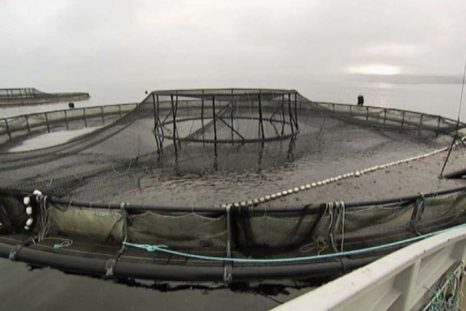
Tasmanian mayor heckled, ‘no confidence’ in minister, over fish farm pollution fears
The sometimes-heated community meeting was called to discuss Tassal’s plan for a fish farm in Okehampton Bay. A petition was also circulated calling on Glamorgan Spring Bay mayor Michael Kent to resign. The town appears to be splitting by some accounts over the fish farm proposal. Councillor Kent told the meeting he had been the subject of a campaign of mistruths and misinformation. Tensions boiled over in the crowd and there was loud heckling and booing. Bumper stickers opposing the project were distributed and slides shown of alleged instances of intimidation. Vision of the current state of Okehampton Bay was also shown. The meeting was also told the fish farm on the state’s east coast would have little economic benefit, and threatened the area’s marine health. continue reading the story here 12:52
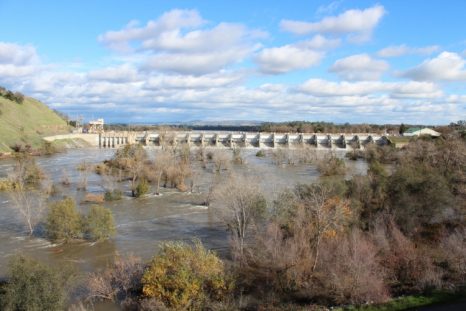
Low Numbers of Sacramento and Klamath River Salmon Point to Poor Season
Recreational and commercial fishermen attending the annual salmon fishery information meeting in Santa Rosa on March 1 received grim news from state and federal biologists – they will see reduced salmon fishing opportunities in both the ocean and the Sacramento and Klamath River systems, due to low returns of spawning fish to the rivers last fall. The pre-season numbers unveiled by Dr. Michael O’Farrell of the National Marine Fisheries Service estimate only 230,700 Sacramento River fall run Chinook adults and 54,200 Klamath River fall run adults will be in the ocean this year. Biologists noted that both forecasts are lower than those of recent years, with the forecast for Klamath fall run being among the lowest on record. Salmon originating from these river systems typically comprise the majority of salmon caught in the state’s ocean and inland fisheries. Ocean regulatory management for salmon fisheries on the ocean from Cape Falcon in Oregon to the Mexico-US Border is heavily based on these runs. continue reading the article by Dan Bacher here 11:22
Stormy weather puts fishing boat in distress, 5 people rescued northeast of St. John’s
 Five people have been rescued from a fishing boat in distress 150 nautical miles northeast of St. John’s. A spokesperson for the Joint Rescue Coordination Centre in Halifax said the boat was in distress due to stormy weather in the area. The JRCC said Sunday it had dispatched a Cormorant, Hercules and two Canadian Coast Guard vessels to the ship in the early morning. JRCC said all five people aboard were rescued by helicopter and taken to Gander. No one was injured. Link 09:58
Five people have been rescued from a fishing boat in distress 150 nautical miles northeast of St. John’s. A spokesperson for the Joint Rescue Coordination Centre in Halifax said the boat was in distress due to stormy weather in the area. The JRCC said Sunday it had dispatched a Cormorant, Hercules and two Canadian Coast Guard vessels to the ship in the early morning. JRCC said all five people aboard were rescued by helicopter and taken to Gander. No one was injured. Link 09:58
Dear Secretary Ross.
 Dear Secretary Ross, As members of our nation’s fishing communities, we want to express our gratitude for making the attainment of maximum sustainable yield in our fisheries a priority for the Commence Department. We are also most appreciative of your publicly stated goal to increase domestic seafood production, which is a priority of Saving Seafood’s National Coalition for Fishing Communities. It is most encouraging that we have a Secretary of Commerce who understands the importance of sustainably harvested seafood. As you know, the U.S. fishing industry is a multi-billion dollar industry, and is a vital economic engine for our coastal communities. The industry is ready and willing to work with you and your department to achieve the goals you have set forth for American fisheries, and we want to build a successful relationship between the Commerce Department and commercial fishermen. We know it is within our means to sustainably increase harvests and achieve maximum sustainable yield. A vibrant fishing industry will pay dividends not only to the coastal communities, but also to the millions of consumers who rely on the nutritional benefits of domestic sustainable seafood. Please click here and sign the petition. 09:39
Dear Secretary Ross, As members of our nation’s fishing communities, we want to express our gratitude for making the attainment of maximum sustainable yield in our fisheries a priority for the Commence Department. We are also most appreciative of your publicly stated goal to increase domestic seafood production, which is a priority of Saving Seafood’s National Coalition for Fishing Communities. It is most encouraging that we have a Secretary of Commerce who understands the importance of sustainably harvested seafood. As you know, the U.S. fishing industry is a multi-billion dollar industry, and is a vital economic engine for our coastal communities. The industry is ready and willing to work with you and your department to achieve the goals you have set forth for American fisheries, and we want to build a successful relationship between the Commerce Department and commercial fishermen. We know it is within our means to sustainably increase harvests and achieve maximum sustainable yield. A vibrant fishing industry will pay dividends not only to the coastal communities, but also to the millions of consumers who rely on the nutritional benefits of domestic sustainable seafood. Please click here and sign the petition. 09:39
Bait company’s freezer nearly empty. Louisiana Wildlife and Fisheries Commission has declared an emergency!
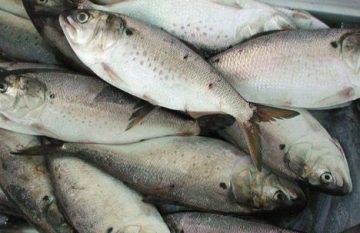 The Louisiana Wildlife and Fisheries Commission has declared an emergency so the state’s one menhaden bait boat can begin fishing two weeks early. Louisiana Bait Products LLC officials say the emergency is that they’ve sold most of the 5,550 tons harvested last year, and don’t want to run out. “We had a pretty start to the crawfish season, so we’ve been selling a lot of our offseason inventory this year,” agent Shawn Switzer said Thursday from the office in Abbeville. Co-founder Daniel Edgar estimated Friday that Louisiana’s crawfish, crab and catfish industries use 37,500 to 50,000 tons of bait a year. Most is trucked in from Virginia, Maryland and New Jersey. “We are going to run out of bait before April,” Edgar said. Read the story here 08:38
The Louisiana Wildlife and Fisheries Commission has declared an emergency so the state’s one menhaden bait boat can begin fishing two weeks early. Louisiana Bait Products LLC officials say the emergency is that they’ve sold most of the 5,550 tons harvested last year, and don’t want to run out. “We had a pretty start to the crawfish season, so we’ve been selling a lot of our offseason inventory this year,” agent Shawn Switzer said Thursday from the office in Abbeville. Co-founder Daniel Edgar estimated Friday that Louisiana’s crawfish, crab and catfish industries use 37,500 to 50,000 tons of bait a year. Most is trucked in from Virginia, Maryland and New Jersey. “We are going to run out of bait before April,” Edgar said. Read the story here 08:38
Questions raised about Coast Guard armed boarding
Pago Pago – 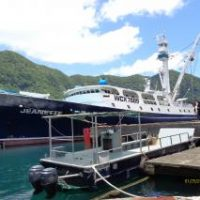 Some new information is emerging about the Coast Guard operation in which the purse seiner Jeanette was boarded by armed Coast Guard personnel at the main dock late last week, Bill Sardinha, whose company Sardinha & Cileu Management, provides services for the Jeanette said in an email to KHJ News, the Jeanette came into port on its own, and not ordered to return as we reported. He said a helicopter pilot on board has fallen ill and this required the vessel o return to Am Samoa for medical care Sardinha explained that the Jeanette was required to notify the US Coast in advance 96 hours, less if an emergency or if circumstance warrants exception, an illness qualifies. So the Coast Guard was well aware of its arrival. Sardinha reports that upon entering port on February 23rd, the Jeanette was surprised to find US government agents waiting to board the vessel with guns. He said the agents boarded the vessel, posted guards, isolated the crew and interrogated them for 12 hours. continue reading the story here 21:50
Some new information is emerging about the Coast Guard operation in which the purse seiner Jeanette was boarded by armed Coast Guard personnel at the main dock late last week, Bill Sardinha, whose company Sardinha & Cileu Management, provides services for the Jeanette said in an email to KHJ News, the Jeanette came into port on its own, and not ordered to return as we reported. He said a helicopter pilot on board has fallen ill and this required the vessel o return to Am Samoa for medical care Sardinha explained that the Jeanette was required to notify the US Coast in advance 96 hours, less if an emergency or if circumstance warrants exception, an illness qualifies. So the Coast Guard was well aware of its arrival. Sardinha reports that upon entering port on February 23rd, the Jeanette was surprised to find US government agents waiting to board the vessel with guns. He said the agents boarded the vessel, posted guards, isolated the crew and interrogated them for 12 hours. continue reading the story here 21:50
Dirty Secret Behind Wind Turbines, They Need Lots Of Oil
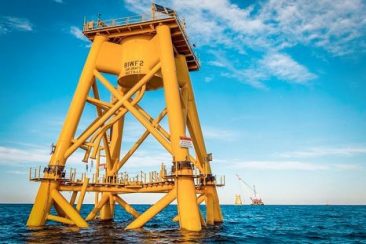 Offshore wind turbines may generate green energy, but they use a lot more oil than proponents like to admit. Just installing the foundation of a single offshore turbine can consume 18,857 barrels of marine fuel during construction, according to calculations published by Forbes Wednesday. Offshore wind farms often have over 100 wind turbines, meaning that building them requires almost 2 million barrels of fuel just to power the ships involved in construction. The Long Island-New York City Offshore Wind Collaborative will cost $1 billion dollar to build and generate roughly 200 megawatts of electricity, enough to provide power to between 40,000 and 64,000 homes — depending on how much the wind blows over the course of the year. continue reading the article here 19:39
Offshore wind turbines may generate green energy, but they use a lot more oil than proponents like to admit. Just installing the foundation of a single offshore turbine can consume 18,857 barrels of marine fuel during construction, according to calculations published by Forbes Wednesday. Offshore wind farms often have over 100 wind turbines, meaning that building them requires almost 2 million barrels of fuel just to power the ships involved in construction. The Long Island-New York City Offshore Wind Collaborative will cost $1 billion dollar to build and generate roughly 200 megawatts of electricity, enough to provide power to between 40,000 and 64,000 homes — depending on how much the wind blows over the course of the year. continue reading the article here 19:39
Lobstermen cheered! LePage removes lobster fee increase from proposed budget
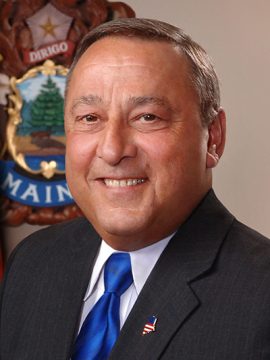 Lobstermen cheered Saturday when Gov. Paul LePage announced at the Maine Fishermen’s Forum that he was pulling an increase in the lobster fishing license fee out of his proposed state budget. The extra money was going to be used to fund new lobster research, new technology for state fisheries researchers and raises for Maine Marine Patrol officers, among other things.,, Under the proposed fee increases, a lobsterman with two deckhands would have paid $114 more a year for his license, bringing the cost of securing a license to more than $1,000 for the first time. Read the story here 16:47
Lobstermen cheered Saturday when Gov. Paul LePage announced at the Maine Fishermen’s Forum that he was pulling an increase in the lobster fishing license fee out of his proposed state budget. The extra money was going to be used to fund new lobster research, new technology for state fisheries researchers and raises for Maine Marine Patrol officers, among other things.,, Under the proposed fee increases, a lobsterman with two deckhands would have paid $114 more a year for his license, bringing the cost of securing a license to more than $1,000 for the first time. Read the story here 16:47
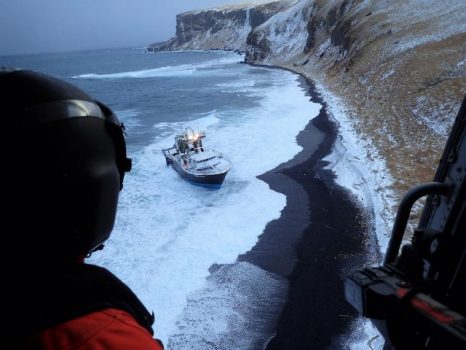
F/V Predator aground for more than two weeks
The grounded fishing vessel Predator remained on the beach in Akutan earlier this week. Salvage crews were attempting to re-float the boat. A large quantity of Pacific cod remains on board, while all the fuel has been removed. Resolve Magone Marine Service logistics coordinator David Maruszak, in Unalaska, said his company has been on the scene with about six salvage vessels for two weeks, but didn’t immediately try to pull the trawler free. An attempt on Monday to pull the boat free failed The re-float project had been underway for about a week, he said, they’re hoping for better luck in the next attempt. Earlier, he said Resolve removed about 5,000 gallons of fuel from the 93-foot-long vessel, homeported in Newport, Ore. Maruszak said the boat will require repairs before it resumes fishing, as several cracks have been noted in the hull, and that the next step once the boat is off the beach is for divers to conduct an underwater survey. Alaska Department of Fish and Game biologist Ethan Nichols in Unalaska said trawler was loaded with 300,000 pounds of Pacific cod, now unfit for human consumption. Read the article here 14:08 A side note! Tonight, I saw a photo of the vessel afloat. They got her off the beach. We will be looking for updates. 20:52
Alaska Crab fishery faces identity crisis, while Fishermen have a tough time finding snow crab
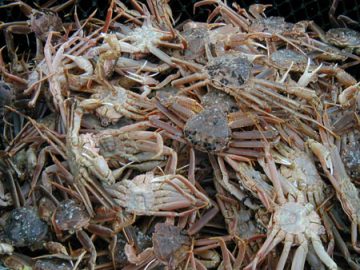 Fishermen are having the toughest time in the past five years finding snow crab, according to the Alaska Department of Fish and Game, in Unalaska. The fleet of 60 crab boats had caught 16. 6 million pounds, for 74 percent of the quota in the Bering Sea, ADF&G biologist Ethan Nichols in Unalaska said Monday. But based on the number of crab in an average pot, the catch has plummeted from a peak of 237 to 116 in the most recent weekly tally, he said. The average weight is 1.3 pounds per individual snow crab, he said. continue reading the story here – Crab fishery faces identity crisis. Is it a bairdi Tanner or is it an opilio Tanner snow crab? Or is it something in between, a hybrid? The Bering Sea commercial crab fishery is facing an issue fundamental to identity, and in what fishery which crustaceans can legally appear. In this issue, it’s up to the Alaska Board of Fisheries. Crabbers and their allies in the Pribilof Islands say a hybrid should be considered part of the catch of whatever the fishermen are targeting, whether Tanner bairdi or Tanner opilio. While both have Tanner in their names, the bairdi are commonly known as Tanners, while the typically smaller opilio are called snow crab. continue reading the story here 12:10
Fishermen are having the toughest time in the past five years finding snow crab, according to the Alaska Department of Fish and Game, in Unalaska. The fleet of 60 crab boats had caught 16. 6 million pounds, for 74 percent of the quota in the Bering Sea, ADF&G biologist Ethan Nichols in Unalaska said Monday. But based on the number of crab in an average pot, the catch has plummeted from a peak of 237 to 116 in the most recent weekly tally, he said. The average weight is 1.3 pounds per individual snow crab, he said. continue reading the story here – Crab fishery faces identity crisis. Is it a bairdi Tanner or is it an opilio Tanner snow crab? Or is it something in between, a hybrid? The Bering Sea commercial crab fishery is facing an issue fundamental to identity, and in what fishery which crustaceans can legally appear. In this issue, it’s up to the Alaska Board of Fisheries. Crabbers and their allies in the Pribilof Islands say a hybrid should be considered part of the catch of whatever the fishermen are targeting, whether Tanner bairdi or Tanner opilio. While both have Tanner in their names, the bairdi are commonly known as Tanners, while the typically smaller opilio are called snow crab. continue reading the story here 12:10
At the Maine Fishermen’s Forum: Lobstermen work with state on new penalties for violations
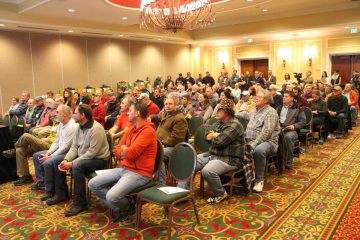 Enforcement of marine resource laws was the top concern when lobstermen met with state regulators March 3 at the Maine Fishermen’s Forum. Maine Department of Marine Resources Commissioner Patrick Keliher and Col. Jon Cornish of the Maine Marine Patrol met with the Maine Lobstermen’s Association in a packed meeting room at the Samoset Resort to talk about the state’s efforts to improve enforcement of marine resource laws. “You guys don’t agree on much,” moderator Patrice McCarron of the Maine Lobstermen’s Association said, earning a laugh from the gathered fishermen. She said the common ground the fishermen had found was their concern about violations. “Lobstermen deserve to work on a level playing field,” she said, but violations make that field unfair, and there was concern the penalties have not been severe enough to deter illegal activity. Work had begun long before the forum with a survey of lobstermen in the association and throughout the fishing industry to see what their top priorities were in terms of enforcement. The results of that survey led to a bill going before the Maine Legislature to improve the state’s lobster laws. continue reading the story here 10:08
Enforcement of marine resource laws was the top concern when lobstermen met with state regulators March 3 at the Maine Fishermen’s Forum. Maine Department of Marine Resources Commissioner Patrick Keliher and Col. Jon Cornish of the Maine Marine Patrol met with the Maine Lobstermen’s Association in a packed meeting room at the Samoset Resort to talk about the state’s efforts to improve enforcement of marine resource laws. “You guys don’t agree on much,” moderator Patrice McCarron of the Maine Lobstermen’s Association said, earning a laugh from the gathered fishermen. She said the common ground the fishermen had found was their concern about violations. “Lobstermen deserve to work on a level playing field,” she said, but violations make that field unfair, and there was concern the penalties have not been severe enough to deter illegal activity. Work had begun long before the forum with a survey of lobstermen in the association and throughout the fishing industry to see what their top priorities were in terms of enforcement. The results of that survey led to a bill going before the Maine Legislature to improve the state’s lobster laws. continue reading the story here 10:08
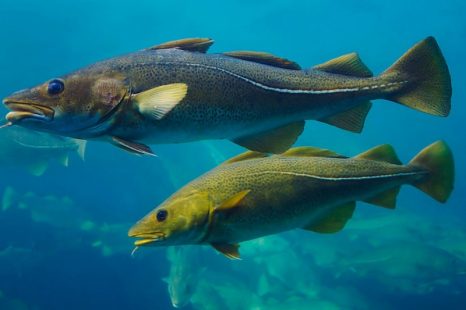
Editorial: Catch-22
Some problems aren’t meant to be solved — at least, not by us. Earlier this week, we ran an editorial (“Sea change,” March 1) about the declines in both the shrimp and crab biomass — and the inevitable problem that is going to create for both fish harvesters and for rural parts of this province that depend on fishing and processing either of those species. Simply put, those communities and workers don’t have options. Part of the editorial talked about the fact that cod are natural predators of shrimp and crab and recovering cod populations are, no pun intended, taking a bite out of those populations. (Warmer ocean temperatures, a product of increased global temperatures, also aren’t helping; higher temperatures are good for cod, but bad, for example, for shrimp.) The editorial said this: “(As) tragic as it sounds, the long-hoped-for return of the cod might be a big part of the problem — because shrimp and crab are prey for codfish.” In retrospect, “problem” might not have been the right word. continue reading the editorial here 09:32
Commercial longline seasons to open March 11th, on time
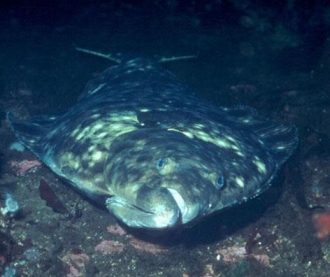 Commercial longliners in Alaska can go fishing on March 11 after all. The National Marine Fisheries Service announced Friday. March 3 that March 11th will be the start date for halibut and black cod fishing. March 11th is the halibut fishing start date approved by the International Pacific Halibut Commission back in January. The National Marine Fisheries Service typically opens long-line fishing for black cod on the same day. President Trump issued an executive order in January requiring that for every one new regulation issued, at least two prior regulations be identified for elimination. The start dates, catch share plan and other changes are all regulations that need to be published in the federal register. As of late last month, the National Marine Fisheries Service was still unsure of the impact of the presidential order on the fisheries. Fishermen in Alaska were questioning whether they’d be able to start fishing on that date. However, the federal agency confirmed Friday that the season would be starting on the 11th for both halibut and black cod. Read the rest here 08:52
Commercial longliners in Alaska can go fishing on March 11 after all. The National Marine Fisheries Service announced Friday. March 3 that March 11th will be the start date for halibut and black cod fishing. March 11th is the halibut fishing start date approved by the International Pacific Halibut Commission back in January. The National Marine Fisheries Service typically opens long-line fishing for black cod on the same day. President Trump issued an executive order in January requiring that for every one new regulation issued, at least two prior regulations be identified for elimination. The start dates, catch share plan and other changes are all regulations that need to be published in the federal register. As of late last month, the National Marine Fisheries Service was still unsure of the impact of the presidential order on the fisheries. Fishermen in Alaska were questioning whether they’d be able to start fishing on that date. However, the federal agency confirmed Friday that the season would be starting on the 11th for both halibut and black cod. Read the rest here 08:52
Controversy brewing over snapper-grouper Exempted Fishing Permit
 A storm is brewing in the South Atlantic region, a storm of controversy over snapper-grouper fisheries access and allocation. A group of four commercial fishing businesses – the South Atlantic Commercial Fishing Collaborative – filed an Exempted Fishing Permit (EFP) application with the National Marine Fisheries Service on Feb. 6. If approved by NMFS, the EFP would allow a group of 25 snapper-grouper boats operated by the four businesses to harvest blueline tilefish, gag grouper, gray triggerfish, greater amberjack, vermilion snapper and species in the jacks complex for two years (2018-19) in a pilot program while being exempt from numerous fishing regulations. The generic name for such a fisheries management method is catch shares, which, according to NOAA Fisheries, is a program in which “a portion of the catch for a species is allocated to individual fishermen or groups. Each holder of a catch share must stop fishing when his/her specific share of the quota is reached.” But it is a concept the huge majority of saltwater fishermen – recreational fishermen and small commercial fishing operations – have proven to be vehemently opposed to. continue reading the story here 08:12
A storm is brewing in the South Atlantic region, a storm of controversy over snapper-grouper fisheries access and allocation. A group of four commercial fishing businesses – the South Atlantic Commercial Fishing Collaborative – filed an Exempted Fishing Permit (EFP) application with the National Marine Fisheries Service on Feb. 6. If approved by NMFS, the EFP would allow a group of 25 snapper-grouper boats operated by the four businesses to harvest blueline tilefish, gag grouper, gray triggerfish, greater amberjack, vermilion snapper and species in the jacks complex for two years (2018-19) in a pilot program while being exempt from numerous fishing regulations. The generic name for such a fisheries management method is catch shares, which, according to NOAA Fisheries, is a program in which “a portion of the catch for a species is allocated to individual fishermen or groups. Each holder of a catch share must stop fishing when his/her specific share of the quota is reached.” But it is a concept the huge majority of saltwater fishermen – recreational fishermen and small commercial fishing operations – have proven to be vehemently opposed to. continue reading the story here 08:12
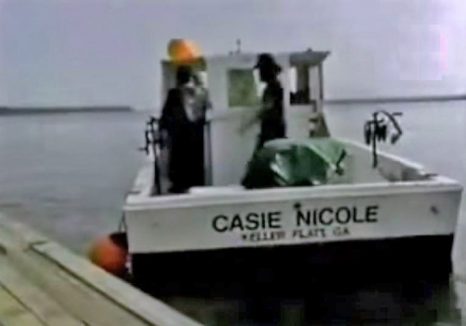
This is the story of the Casie Nicole a boat captained by Billie Joe Neesmith
On April 11, 1990, Nathan Neesmith, his brother Billy Joe Neesmith, his nephew Keith Wilkes, and his friend Franklin Brantley set off from McIntosh County pier in Georgia to go on a seven-day commercial fishing expedition. Their ship, Casie Nicole, had just recently been docked for maintenance. They took it to an uncharted reef off the coast of South Carolina. Early in the morning on April 12, their boat capsized and quickly took on water. They had to abandon the ship, so they boarded a raft. Nathan Neesmith left the other three men in the raft with some food and went off in a wooden box to go find help. He was rescued five days later, but the rest of the men were never found. The only things ever found were a sleeping bag and a life vest. To this day their fate is unknown. They were about 65 miles off shore, and Nathan said that he’d got up around three-thirty, four am in the morning, started the engine, and started driving to somewhere to go fishing. He noticed the boat was heavy with maneuvering, and it wasn’t going over the waves, it was kind of ploughing through them,,, continue reading the story here 22:33







